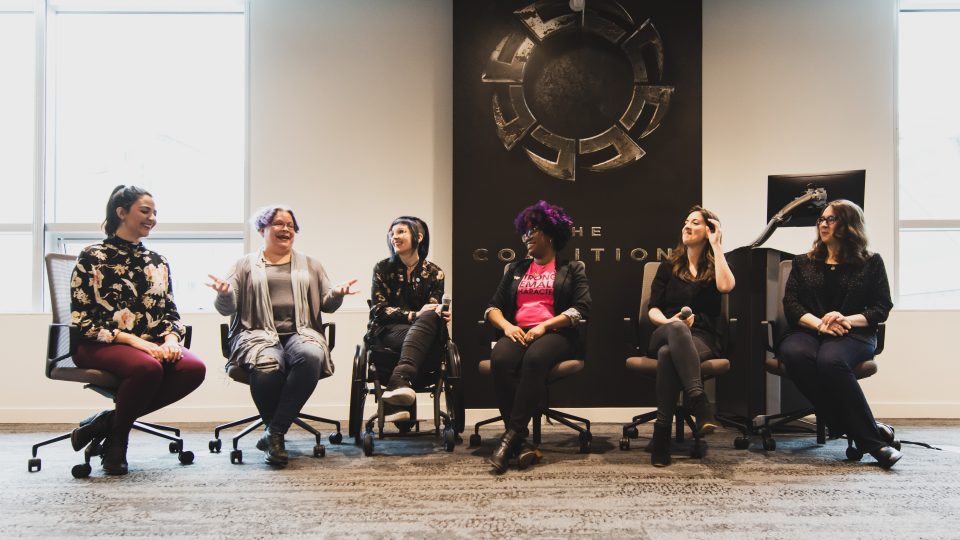On a Saturday in January, developers, artists, producers, writers, designers, allies and advocates gathered to talk about the value of diverse characters in video games. At the front of the room, six expert panelists working in development fielded questions on the demand for representation, where to focus early efforts and the hard truths about getting it right.
“We’ve come to a point where people want to move forward,” noted Melissa Boone, Xbox Senior Researcher. “We’re seeing people respond in a way that they never really have before.”
Cherry Rae, an accessibility advocate and consultant agreed. “[Video games] are escapism with reality checks. They can teach, they can help us evolve, they can help us learn things about ourselves that we didn’t realize.”
Joining Melissa and Cherry on the panel were Narrative Director at WB Games Montreal – Ann Lemay, Franchise Narrative Lead at The Coalition – Bonnie Jean Mah, and Art Director at Phoenix Labs – Katie De Sousa.
Games are arguably more immersive than movies or books. They pull the player in and provide an opportunity to experience something new. They’re persuasive. And as Uncle Ben taught us, with great power comes great responsibility.
“It’s important that we are aware of the power we hold as creators, and the impact we can have on our audience,” explained Lemay. “We have had people stand up at events and say – thank you for acknowledging I exist – because they don’t see themselves in traditional media.”
The fact is diverse representation makes good businesses sense. It can draw more people to a game and drive increased revenue. It also reflects reality. Build a more complex, relatable world, and you’ll have more interesting avenues for storytelling.
The shift towards better representation can begin simply, with research. Industry leaders and advocates are already talking about the need for diversity in articles, interviews and conferences, most of which are recorded these days. The work is available and often free. Hiring consultants and building diverse internal teams were also recommended. The panelists noted that individuals working on the game can provide a much-needed pulse check. And then, there’s the players themselves. Curious about what they want to see? Ask them.
“I went on twitter and asked – what are you sick of seeing in a character creator, are there any barriers in how you represent yourself,” recalled De Souza. ”The answer was, don’t make me choose a male or female, just let me pick my own pronoun the same way I pick a body type.”
And while it’s best to get that feedback at the start of the development cycle, the panel called out that it’s just at critical at the end. Their advice…engage QA and the Community Team early and often. They’ll catch things along the way and can give both designers and developers a better understanding of who’s playing and what they’re saying. And then…test everything.
“You don’t need a fancy lab to do usability testing. You need something to take notes on, a person to play your game and your actual game. That’s pretty much it,” noted Boone. “Watch them. Think a lot as they play it. Take notes. Don’t say much. The fancy stuff just adds a couple extra tools.”
As the talk went on and questions were asked, actionable tips emerged. A single representation won’t give you much room to develop character (think stereotypes and clichés), so build a diverse world where background characters offer additional depth. Consider reversing the pipeline – there will always be budget and time to create a male character. Be positive about the work. There will be negative comments, you’ve got to have respect for the audience and stand up with everyone in the industry trying to make it better. Also, expect to get it wrong. There will always be someone who says, that doesn’t represent me.
“Have faith in the stories you’re telling,” Mah explains. “We need to do our part to question what we’re putting out there and if we believe it’s the right story to tell, we can weather any criticism.”
The event was championed by The Coalitions Women in Gaming Co-Leads Rose Gunson, Esports Creative Program Manager and Zoe Curnoe, Lead Campaign Producer Gears 5 and moderated by Carolina Smith, Senior Producer of Creative Services. Women in Gaming is a community of women from Team Xbox dedicated to leading the gaming industry forward by growing, attracting and retaining women in the games industry. The Coalition will release Gears 5 this year, with Kait Diaz as the lead character.




